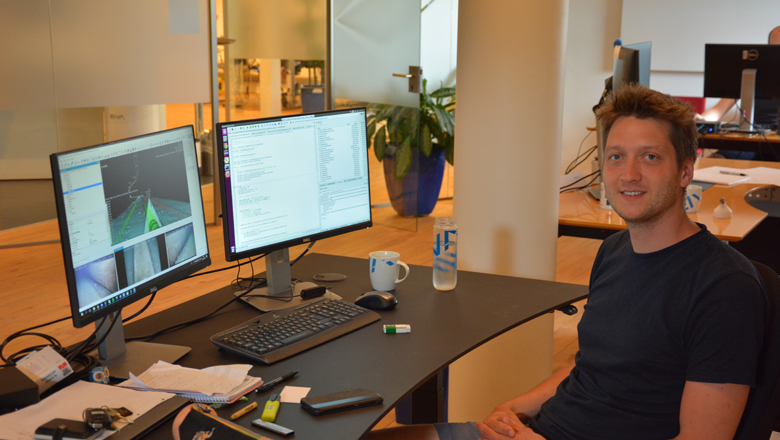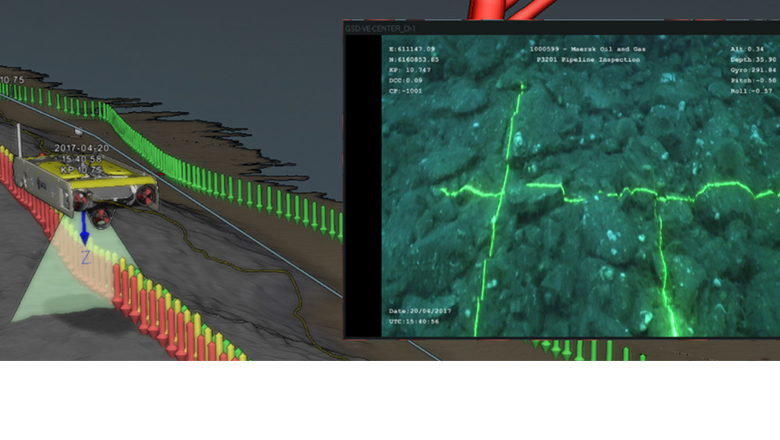
To use this site, please enable javascript

To use this site, please enable javascript
In collaboration with Innovation Fund Denmark and Aarhus University, EIVA has established an industrial post-doc research project geared to advance state-of-the-art visual-based navigation for autonomous underwater vehicles (AUVs).

The two-year project, being undertaken by post-doc candidate Peter Christiansen, will investigate computer vision and deep learning algorithms to enable global positioning of AUVs, as well as both the navigation and automatic inspection of subsea pipelines.
The post-doc project entitled – ‘Visual Based Navigation for Autonomous Underwater Vehicles’ – is being funded evenly by Innovation Fund Denmark and EIVA, and is scheduled to run until 2020.
Seeking to implement multiple novel systems into EIVA NaviSuite software, the project reflects EIVA’s steadfast commitment to drive the maritime survey industry forward with the development of powerful new technologies that advance solutions beyond convention.
EIVA CEO, Jeppe Nielsen, commented: ‘We are thrilled to be collaborating with Innovation Fund Denmark and Aarhus University on this post-doc project, and proud to support this kind of applied research.’
‘The maritime industry stands to benefit greatly from the field of deep learning, and so we are keen to facilitate its development. By incorporating new deep learning solutions directly into EIVA NaviSuite software we will be ensuring only minimal barriers to customers keen to adopt these more effective and automated procedures.’
Explaining the basis for the project, Christiansen said: ‘The recent advances in computer vision and deep learning have made vision-based systems highly valuable in the development of autonomous systems. In the automotive industry, cameras are used for lane assist, detecting obstacles and sign recognition. Less obviously, cameras can improve positioning and navigation, for instance by recognising specific or known landmarks within a scene.’
‘The ultimate goal of this post-doc project is to bring these proven technologies into maritime surveying and take advantage of the benefits they offer. Being hosted at EIVA – with such great resources available and amongst its software and established computer vision teams – represents a unique opportunity to turn research into application.’
Today, the inspection of pipelines is an operation typically performed with a manually controlled, remotely operated vehicle (ROV) requiring a vessel with an acoustic positioning system to locate the ROV and a connecting cable to manually navigate it.
Once pipelines are located, inspection is a manual process, requiring operators to meticulously identify and annotate hundreds of thousands of features of interest. Altogether, it's an expensive and time-consuming setup.

An ROV performs a visual analysis of the seabed using visual information derived from an RGB camera
Instead, an AUV (vehicles which are increasingly being utilised in subsea survey work) equipped with an underwater global positioning system and the ability to undertake pipeline inspection operations automatically, represents a route to considerable potential in vessel and crew costs.
A global market leader in offshore survey software, with numerous high-profile offshore industry companies and underwater asset owners as customers, EIVA is well-suited to foster the project.
Peter will not be alone in his research; he will work within the recently established deep learning team at EIVA and alongside the broader software team which holds an abundance of collective research and development experience and maritime survey expertise.
Specialised in digital signal and image processing, Christiansen holds degrees in technical IT (masters) and in electro engineering (bachelors); he completed his PhD at the Department of Engineering, Aarhus University.
Encouraged by the prospect of directly supporting the application of cutting-edge research into real world domains, EIVA will also sponsor BSc and MSc projects to further strengthen collaboration with Aarhus University, and support further important research.